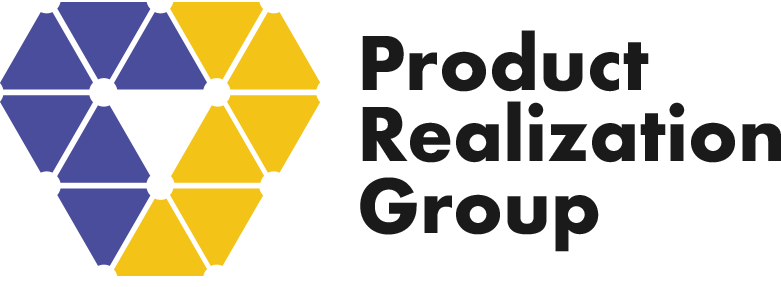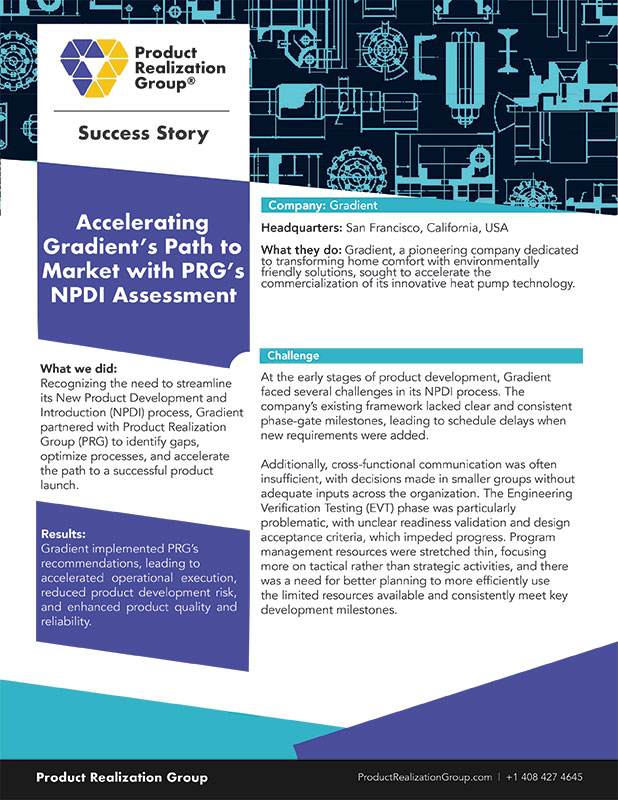
Client Background:
Gradient, a pioneering company dedicated to transforming home comfort with environmentally friendly solutions, sought to accelerate the commercialization of its innovative heat pump technology. Recognizing the need to streamline its New Product Development and Introduction (NPDI) process, Gradient partnered with Product Realization Group (PRG) to identify gaps, optimize processes, and accelerate the path to a successful product launch.
Challenge:
At the early stages of product development, Gradient faced several challenges in its NPDI process. The company’s existing framework lacked clear and consistent phase-gate milestones, leading to schedule delays when new requirements were added. Additionally, cross-functional communication was often insufficient, with decisions made in smaller groups without adequate inputs across the organization. The Engineering Verification Testing (EVT) phase was particularly problematic, with unclear readiness validation and design acceptance criteria, which impeded progress. Program management resources were stretched thin, focusing more on tactical rather than strategic activities, and there was a need for better planning to more efficiently use the limited resources available and consistently meet key development milestones.
PRG’s Solution:
PRG engaged with Gradient through a comprehensive NPDI Diagnostic Assessment, designed to understand the current process, expose inefficiencies and improve the overall product development process. The project included an in-depth review of existing processes, interviews with key stakeholders, and a collaborative analysis to map out a more effective NPDI framework.
Key recommendations from PRG included:
- Enhancement of the NPDI Process: PRG provided clarity on NPDI structure, emphasizing the need for a well-defined “out of bounds” framework to handle escalations, critical risks, and program changes.
- Improved Cross-Functional Program Management: PRG recommended a more focused approach to core team meetings, ensuring discussions centered on critical due dates, risk mitigation, and cross-functional decisions.
- Strengthened EVT, DVT, and Reliability Test Plans: PRG suggested the development of holistic verification plans, complete with clear exit criteria and resource-loaded tasks to ensure comprehensive and effective testing.
Results:
The implementation of PRG’s recommendations yielded significant strategic benefits for Gradient:
- Accelerated Operational Execution: With more robust processes and improved cross-functional alignment, Gradient enhanced its ability to meet development schedules and efficiently allocate resources.
- Reduced Product Development Risk: Through stronger processes, enhanced communication, and greater accountability, Gradient was able to mitigate risks associated with product development.
- Enhanced Product Quality and Reliability: By adopting a more structured approach to product definition, verification, and testing, Gradient improved the overall performance and reliability of its heat pump technology.
Conclusion
PRG’s NPDI Impact Assessment provided Gradient with the tools and insights needed to streamline its product development process, ensuring a smoother and more predictable path to market. As Gradient continues to innovate in the HVAC industry, the foundational improvements made through this collaboration will support the company’s long-term growth and success in delivering environmentally sustainable solutions to the market.
“Working with PRG was a game-changer for Gradient. Their expertise in NPDI provided the structure and clarity we needed to navigate the complexities of our product development process. The actionable insights and process improvements they recommended laid the foundation for accelerating product development and scaling the business, not just for this product, but for all future innovations.”
— Jeff Rosen, COO of Gradient

 DOWNLOAD
DOWNLOAD
